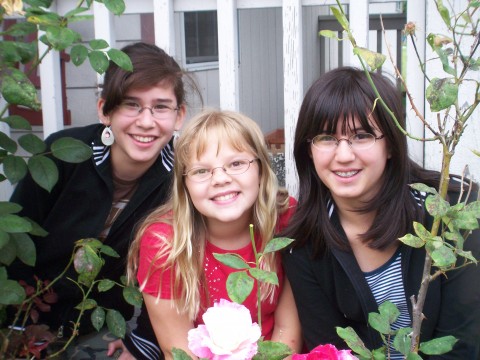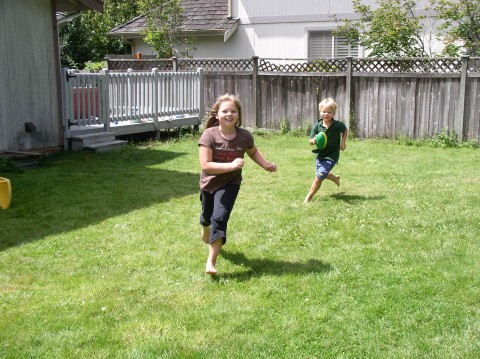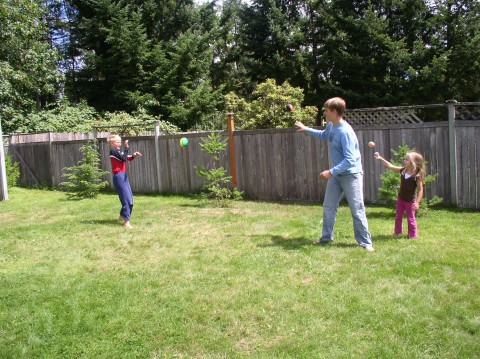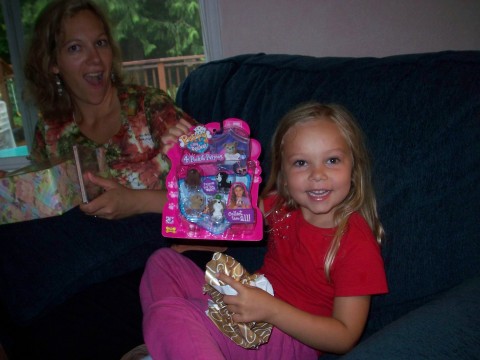Last Monday night, Kathy attended a women’s Bible study at our church. I always like to encourage her to make the most of these kind of opportunities, although it does cut short the time we have together in the evening. As she rushed out the door, I settled down to play my latest favorite computer game, Port Royale 2.
Alas, it was not to be. First Daniel, then Rachel came to my negative attention for various infractions. I spent the bulk of the evening talking with them in turn, rebuking and correcting their foolishness and sin. I was very discouraged by the experience, and I assume that they were as well. It seemed like a classic lose/lose situation, where I lost time and energy and they didn’t gain from my long lecture, but instead our relationship was further strained.

On Monday I helped Rachel to make smoothies for some roofers across the street. She has been so eager to earn money for the camp she hopes to attend in August, and I wanted to help her. We made the blends and constructed a ‘Donations’ box for her to carry, and I sent her off with a brother to guard her. She came back elated with $7.50 in donations, in spite of the earlier visit of the high-priced ice cream truck.
I suggested that on Tuesday she should beat the ice cream vendor out, and recommended that she make the smoothies right after lunch and offer them to the workers in the early afternoon. When I got home from work, I asked her how much she earned from donations, and she told me they hadn’t yet made them. I was non-plused — why hadn’t she followed my recommendation?
I asked her, perhaps a bit more critically than I intended: “Why didn’t you make the blends early, as I suggested?”
Rachel visibly deflated, as I continued to apply my critical skills. “I thought I made that really clear. Don’t you want to earn money for camp?” She didn’t really have an answer, and I never did find out why she didn’t make the smoothies earlier in the day, except that Kathy said they had been busy with school. I misapplied my analytical skills to a situation that didn’t really call for anything except encouragement.
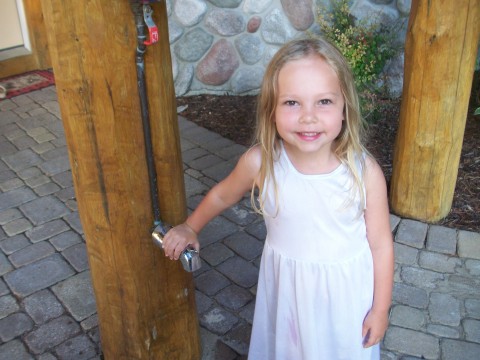
At the cottage on the shores of Lake Michigan, Sarah and her cousin often hogged this outside shower, sometimes for 30 minutes or more.
Sometimes Daniel and Rachel are a little afraid of me. I have a very low tolerance for sin (at least in other people), and I am very likely to notice imperfection. As a programmer, I get paid all day long to find things that are wrong or poorly designed, and fix them. Nobody hires a programmer to come in and tell them what lovely systems they have, or how nicely they are getting the job done! All of my kids are sensitive to my disapproval, to varying degrees … sometimes they avoid me for fear that I will say something critical about their behavior.
At home, there doesn’t seem to be a major need for a programmer. I spent some time reflecting, how would I like it if God mostly paid attention to my failures and faults, and only rarely complimented me or showed me His smile?
On Tuesday evening, I had a chance to pray with our pastor and most of the elders. I asked them to pray for me and for my relationship with Rachel and Daniel, which they very kindly did. On Wednesday morning, I met with my men’s accountability and prayer group, and asked for prayer about the same thing. They advised and prayed for me so thoroughly and sweetly that I came away determined to make a change in the way I relate to my children. As one of them pointed out, perhaps the biggest change needs to be made in the way I relate to my kids.

Knowing when to run is an important survival skill.
Thursday night I gathered the three older kids and talked to them about how I want to change. I explained that I plan to give them more responsibility and autonomy in their lives and that they would need to learn to answer to God directly, instead of always going through me. I told them that I was sorry I was so critical, and that I would try to keep my mouth shut, especially about the little things. I shared with them my plan to write complimentary e-mails to them and I told them how proud I was of them. I told them I was going to try not to ‘sweat the small stuff’. It was a very pleasant, cheerful time, and they listened closely, if a bit skeptically.

Rachel is pretty wise, actually, and knows when to wear a life jacket.
After I sent Daniel up to bed, an uproar began, and I walked to the foot of the stairs to investigate. Using my gentlest, kindest and most reasonable voice, I told Daniel to get back to brushing his teeth and getting into his pajamas, since he was in Rachel’s room and wasn’t obeying the instruction he had received (to go to bed).
Daniel immediately became sulky and resentful, and (after I went upstairs and tried unsuccessfully to reason with him) I gave up and went back down to talk with Kathy. I was very discouraged and shared my frustrations at some considerable length, while Kathy listened sympathetically.
After about five minutes of this, Kathy pointed out that by allowing myself to be discouraged, I was actively cooperating with Satan’s plan, and listening to his lies. Kathy and I amused each other for several minutes by swapping the lies that Satan wanted us to believe:
- It’ll never work. You can’t change the way you relate to your kids.
- See? This is why you shouldn’t bother — even when you make a good effort, Daniel doesn’t respond properly.
- You should just stick with harsh justice. If he turns his back on you and on God the day he turns 18, that’s his problem — your hands will be clean.
- The prayers of all those elders and other men don’t change anything — just forget about it.
- God doesn’t have the power to intervene in this situation, or He doesn’t care.
- The kids will never learn, you’re just wasting your time.
- Surely you have more important things to do?
About ten minutes later Daniel came down the stairs and apologized for his surly attitude. He had picked out a little wooden submarine that he had made and wrote “To Daddy, from Daniel” on it, with this cool invisible ink pen he has. He gave the boat to me to show he wanted to be ‘right’ with me and was sincere in asking forgiveness.

I hugged him and accepted the submarine and thanked him for it. I told him I forgave him and that it was hard for me to know what was small and what was not, and which things to overlook, but that I was still committed to keep trying. He went to bed happy and cheerful.
I find myself stunned by the speed of his turnaround, and by the obvious effectiveness (efficaciousness?) of the prayer of these righteous men. It made me wonder, how often have I given up on something just moments before God is bringing about a change?
One of the parenting resources we have used over the years has been Gary & Anne Marie Ezzo’s Growing Kids God’s Way. Foundational to the GKGW philosophy is the idea that in the early years (0-5) parenting is mostly authoritarian, as in, “You do what I say because I say so.” As your children begin to mature (6-11), you begin sharing basic principles (respect for things, respect for others, respect for God) and backing them up with Biblical teaching. This can be summarized: “You do what I say because it is right.” Once your children enter adolescence (12-17), you move to a coaching relationship wherein the child is given more autonomy and allowed to make decisions (and mistakes) under your advice and direction, but without you necessarily standing over them. The metaphor used for this stage is that of a high-school ballgame — as the coach, you are on the sidelines, and it is the child who actually plays the game. You still have access to the child during half-time and in practice sessions, but there is a very real sense in which they are the one playing the game. “You do what is right because of your relationship with God and with me,” is one way to put it. (There is a lot more to the GKGW material, and I may not have summarized it very well, but, hey, that’s one part of it that stuck with me.)

I don’t have a lot of trouble with the authoritarian model, and my spiritual gift as a teacher comes in very handy during the middle years. Moving to the coaching stage is the one that seems very difficult to me, especially if there is any real possibility that my children will make mistakes. I love my sons and daughters dearly, and I don’t want them to experience the consequences of their sin or foolishness. But if I continue to stand over them and force them to do what is right, they’ll miss out on chances to develop moral and spiritual muscles. I want them to be prepared to stand against temptation of all kinds when they are out on their own, and I don’t want to provoke them into rebellion by failing to give them the appropriate autonomy for their age and maturity.

Nor do I want my children crushed by the surf of life.
This parenting stuff is hard, some times. I’ll let you know if I get it all figured out. 
Related posts:
![]()






